Toggle switches are a simple way to activate accessories in your car. There are many ways they can be used and wired. Here we will go through some basic applications and switch types. Note the included diagrams are for reference only. Always make sure you are using a switch and wire sufficient to handle the power you are carrying. In higher draw applications, a relay may be utilized (to be covered in another article)
If you have any doubts, go to a professional. Improper wiring can damage your vehicle’s electrical system or cause a fire.
xx
1. SPST Toggle switch (Singe Position, Single Throw)
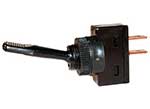
A SPST switch is a simple On – Off switch. They typically have two terminals. One is for input, the other for output.

In one position the switch is ‘Open’ and no connection is made, and no power can flow to the accessory. In the other position the two terminals are connected and power can flow through.
Here is an example of how a SPST might be wired to power a light.

===================================================================================
2. SPDT Toggle Switch (Single Position, Dual Throw)
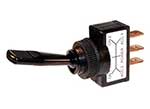 xx
xx
A SPDT is a bit more sophisticated. It makes one of two connections. Here is a diagram of a SPDT toggle switch.

Terminal 1 is connected to one load or accessory, Terminal 3 is connected to another load or accessory. Terminal 2 is connected to power. The switch is always making one of the two connections and flips between them. As long as power is connected to the switch, one is always ‘On’.
In the below example the red light is illuminated in one position and the blue light is illuminated in the other position.
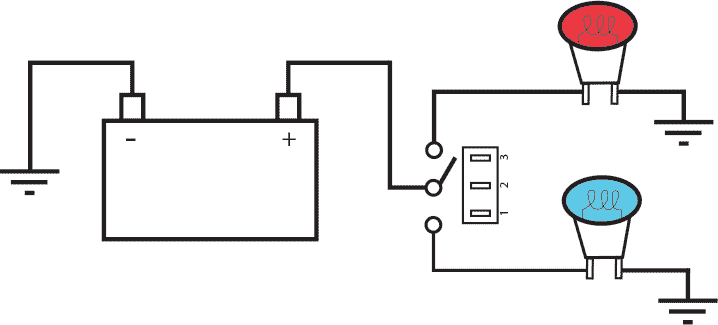
===================================================================================
3. DPDT Toggle Switch (Dual Position, Dual Throw)
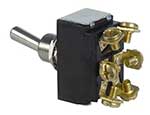
A DPDT switch can be a bit confusing. It might be easiest to consider it to be two SPDT switches in one. They can connect two different power sources to two different loads or accessories at the same time. Here is a diagram.
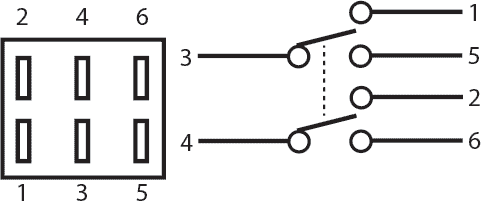
A DPDT switch has six terminals. #3 and #4 connect to the power source. #1, 2, 5 and 6 are for the loads/accessories. In one position power from terminal 3 is connected to terminal 1, AND power from terminal 4 is connected to terminal 2. In the other position power from terminal 3 is connected to terminal 5 AND power from terminal 4 is connected to terminal 6.
Suppose you had a small cooling fan you wanted to run on cool days and a larger cooling fan you wanted to run on hot days. You wanted an indicator to signal which was being used – a blue light for the small fan, and a red light for the big fan. Here is how you might accomplish that with a DPDT switch. Note that either one or the other is running, there is no way to disconnect both fans and lights as long as power is running to the switch. (Radiator fans can draw a lot of current, this is an instance where a relay might be warranted – this is just an example of how a DPDT switch might be used)
